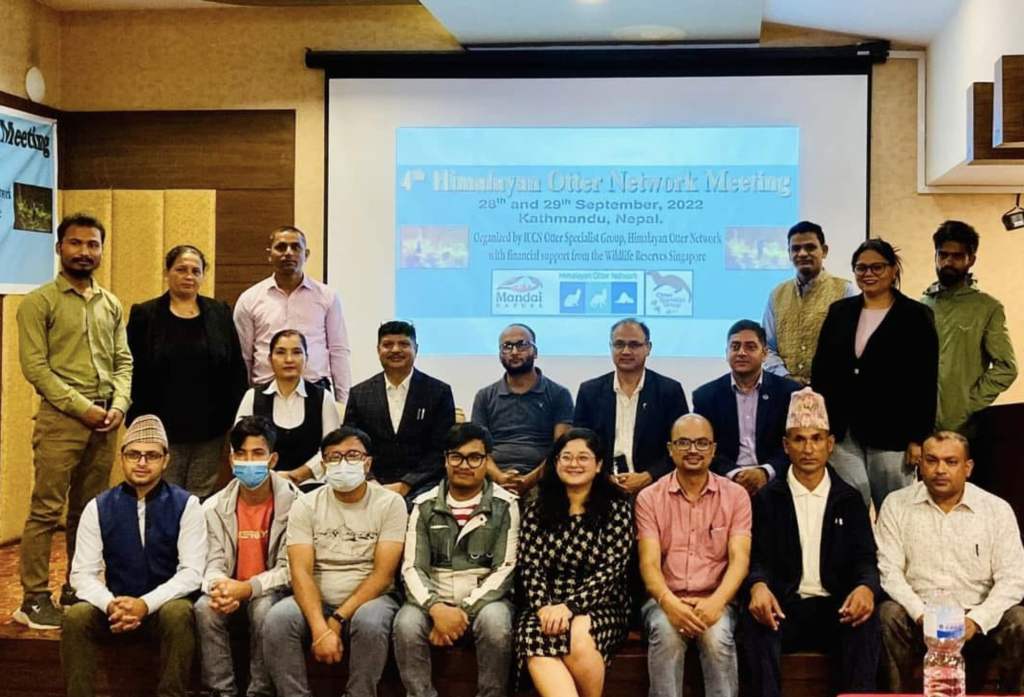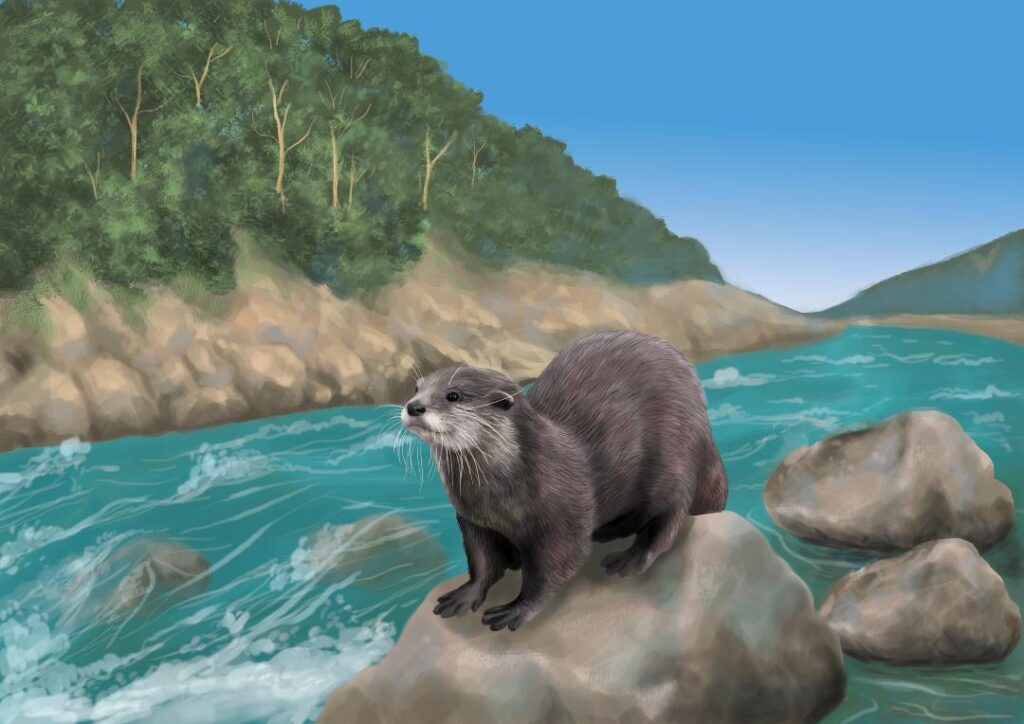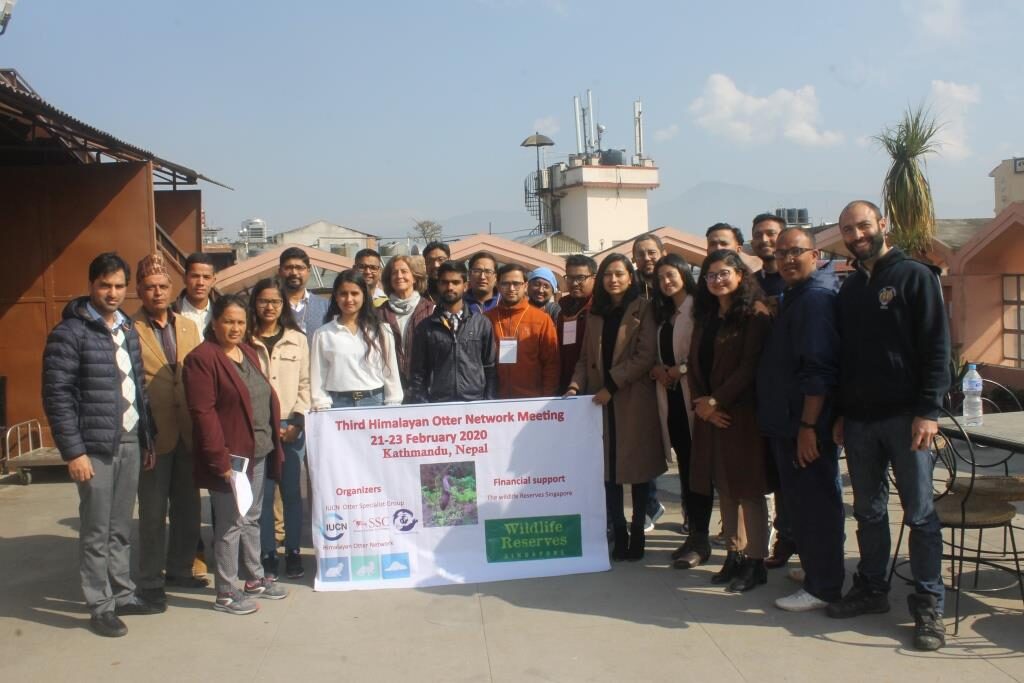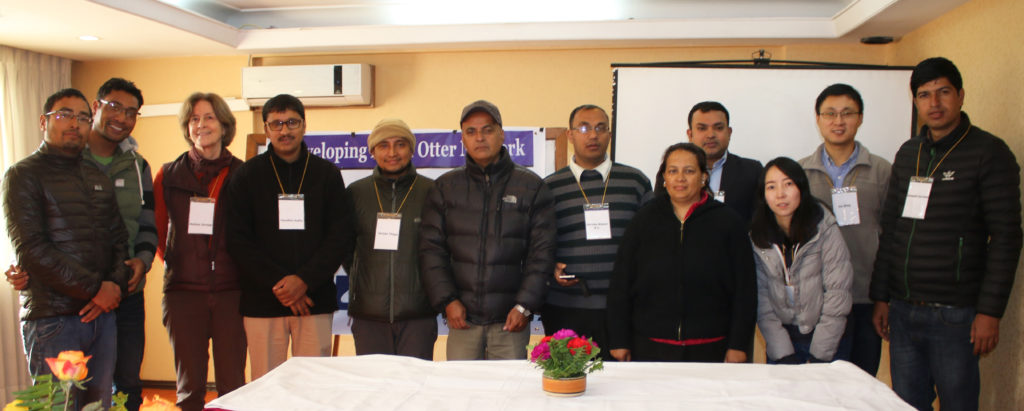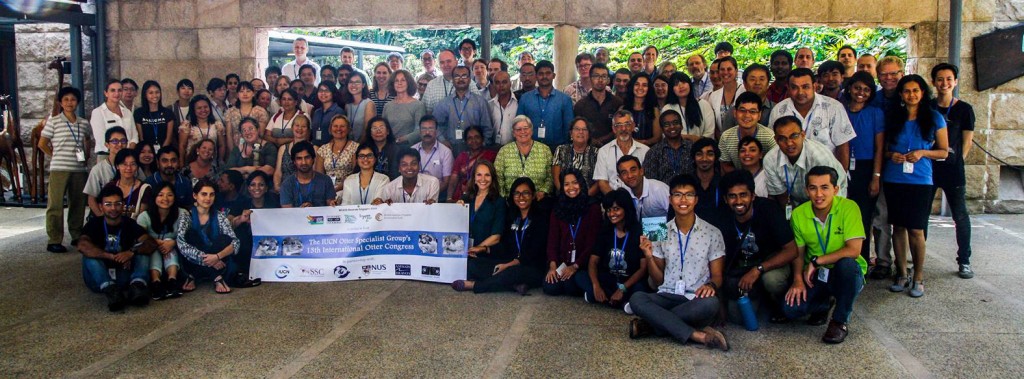Darwin Initiative Funds a Three-Year Project in Nepal – August 2023
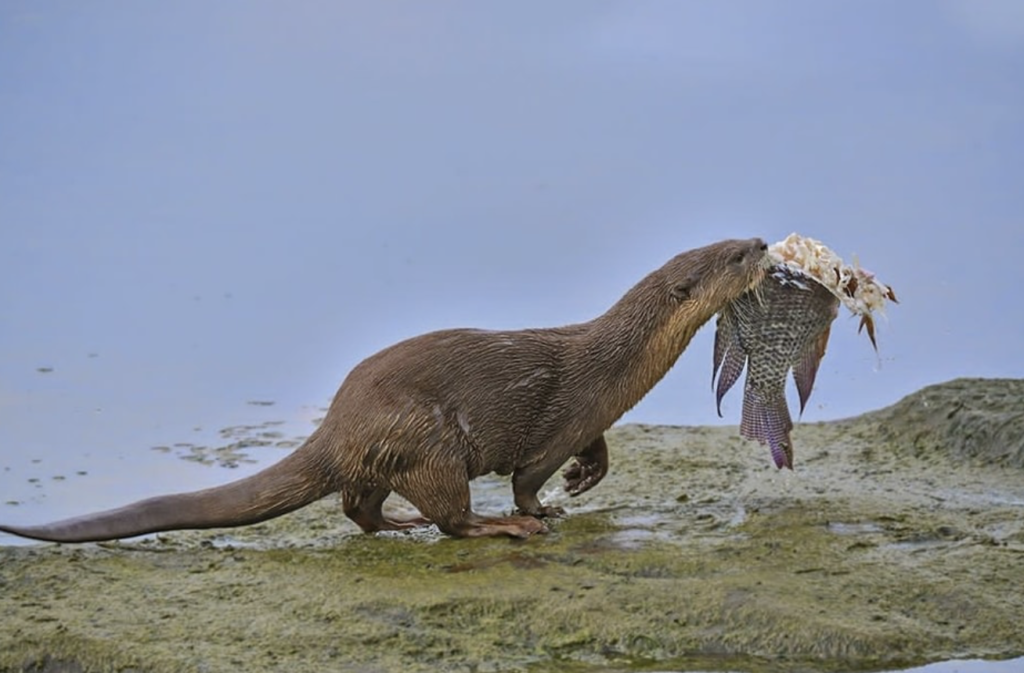
Strengthening communities’ livelihood and stewardship to conserve otters in Nepal
In the Lower Karnali Watershed in Western Nepal, indigenous river dependent communities and otters alike share and benefit from healthy river ecosystems. However, intensive fishing practices and river aggregates mining have severely depleted natural fish stocks, threatening the traditional livelihoods of Tharu and Sonaha communities. A project, funded to WWF/UK and WWF/Nepal, will improve the wellbeing of 200 marginalized river dependent households through inclusive community-based conservation of freshwater resources and livelihood diversification. Declining fish populations due to overfishing and habitat disturbance caused by intensive river aggregates mining threaten the health of the river ecosystem and smooth-coated otter populations which are in decline. The project will develop an inclusive and climate-smart otter National Otter Conservation Strategy for Nepal through a series of consultation workshops and multi-stakeholder meetings with federal, provincial and local governments, conservation organisations, and local communities.
The Fourth Himalayan Otter Network Workshop – Sept 2022
The Fourth Himalayan Otter Network Workshop was held at Kathmandu, Nepal in September 28, and 29, 2022. The objectives of the workshop were: 1) to give the network partners an opportunity to share information on otter status and distribution, survey successes, failures, and future plans to sharpen otter research and conservation approaches 2) to strengthen a Himalayan-wide network of otter researchers and conservationists 3) to present findings of the recent Nepal Otter Conservation Action Plan (NOCAP) surveys and public awareness projects by Himalayan Otter Network (HON) members over the past two years, and to prepare those presenters to publish 4) to collate the documentation of otter status and distribution collected by NOCAP surveys and move toward the creation of a national strategy for otter conservation.
The meeting was organized for two days, with the first day formal inauguration program and presentations by researchers about on-going and recently completed otter research projects. The chief guest was Maheswaran Dhakal from Nepal’s Department of National Park and Wildlife Conservation. The second day was devoted to discussions about continuing development of the Nepal Otter Conservation Action Plan. There were 27 participants from Nepal at the Workshop representing researchers, government departments, academia, NGO representatives and local community members.
New Otter Booklets from Nepal
Sagar Dahal, founder of the Small Mammals Research and Conservation Foundation in Nepal, has just published two educational booklets on the Eurasian otter and the Smooth-coated Otter. The booklets, supported by a grant from Community Conservation in the US, are being distributed widely across Nepal, both in English and Nepali, to libraries, NGOs, and Wildlife Reserves and National Parks. They are beautifully illustrated with accurate paintings of the species by Kuldup Bahadur Gurung.
Third Himalayan Otter Network Workshop – Jan 2020
In February 2020, the Third Himalayan Otter Network Workshop was held over three days in Kathmandu, Nepal in January 2020. Twenty-five participants, from Nepal, India, Italy and the US, shared their new work and discussed goals and plans for the future. New collaborations were started, and past collaborations were strengthened. Presentations on research and conservation projects across the Himalayas demonstrated the rising level of understanding of otter ecology as well as new student engagement in otter studies. A group discussion fostered progress on the creation of a Nepal Otter Action Plan, to draw attention to and upgrade the legal protection status of otters, and to create education and public awareness programs in key parts of Nepal.
A Phase I document, focusing on research needs and results is now published by Sanjan Thapa and the Nepal collaborative. The Workshop was supported by a generous grant from Wildlife Reserves Singapore.
Participants: Jyoti Bhandari (organizer), Paras Acharya, Aarati Basnet, Dhruba Bijaya, Bhuwan Singh Bista, Ramesh Bahadur Boharam, Sagar Dahal, Sujita Dahal, Prashant Ghimire, Subarna Raj Ghimire, Dinesh Kumar Neupane, Nishikant Gupta, Sarjan Gwachha, Pushpinder Jamwal, Jibesh K.C., Promad Neupane, Bhawana Parajuli, Kamana Pathak, Tejab Pun, Lorenzo Quaglietta, Melissa Savage, Raj Kumar Shahu, Purna Man Shrestha, Mohan Bikram Shrestha, Pramila Thapa, Sanjan Thapa.
2nd Himalayan Otter Network Meeting – Feb 2019
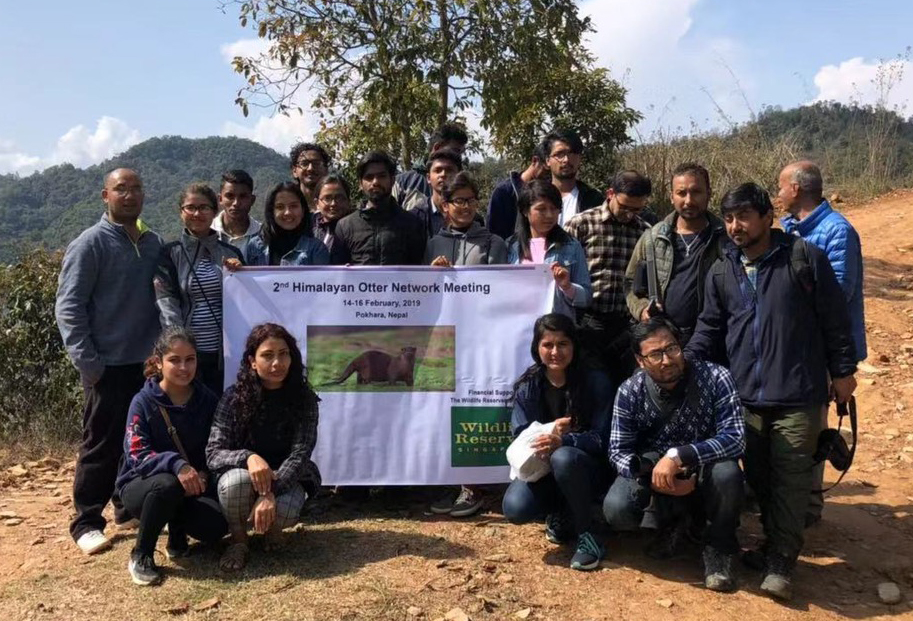
The 2nd Himalayan Otter Network meeting was hosted in Pokhara, Nepal on the 15th and 16th of February 2019. The main focus of this meeting was to strengthen and solidify the group by bringing together the original and new participants of the 2017 Otter Workshop, with the aim of developing a Himalayan Otter Conservation Action Plan and was supported by a grant from Wildlife Reserves Singapore. The first day was an indoor session, during which speakers presented ongoing and past otter research projects and there was a discussion about agendas. On the second day there was a field trip with a demonstration of camera trapping methods.
21 participants from Nepal were present, representing government departments, academia (Tribhuvan University), the non-profit sector, one international participant from India and students interested in doing future research projects on otters in Nepal. Mr. Bishnu Shrestha, Undersecretary of the Nepal Dept of National Parks and Wildlife Reserves was also in attendance.
On the whole, the meeting was a success and we would like to thank all those that dedicated time and energy to the two days we organised. (Written by Jyoti Bhandari)
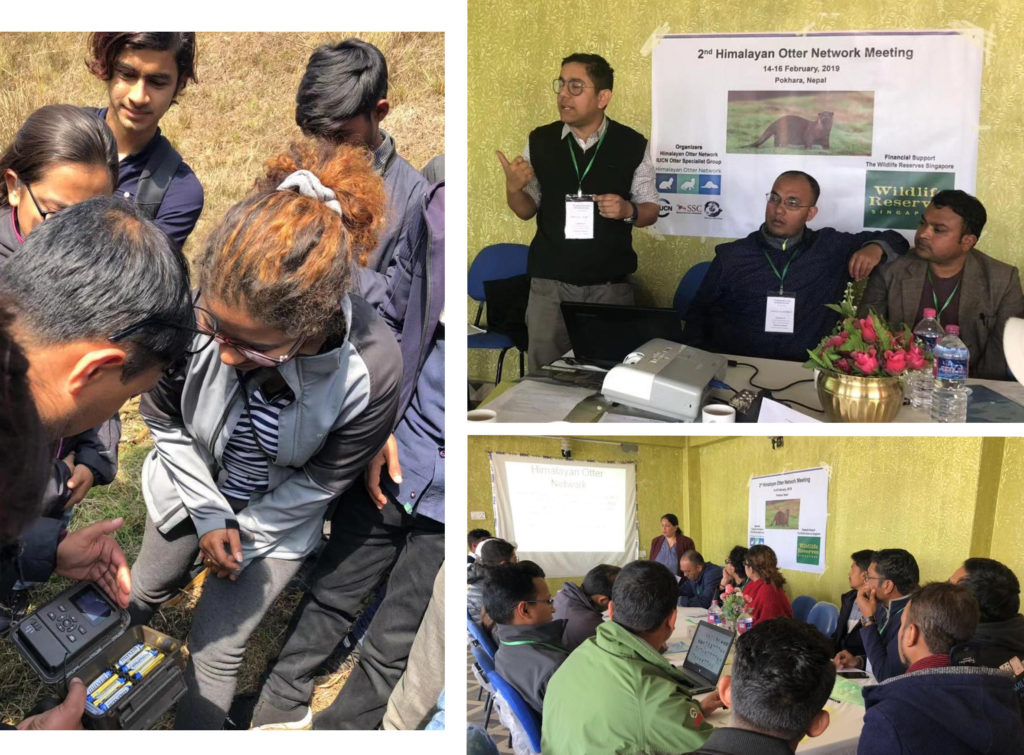
World Otter Day in Nepal – May 2017
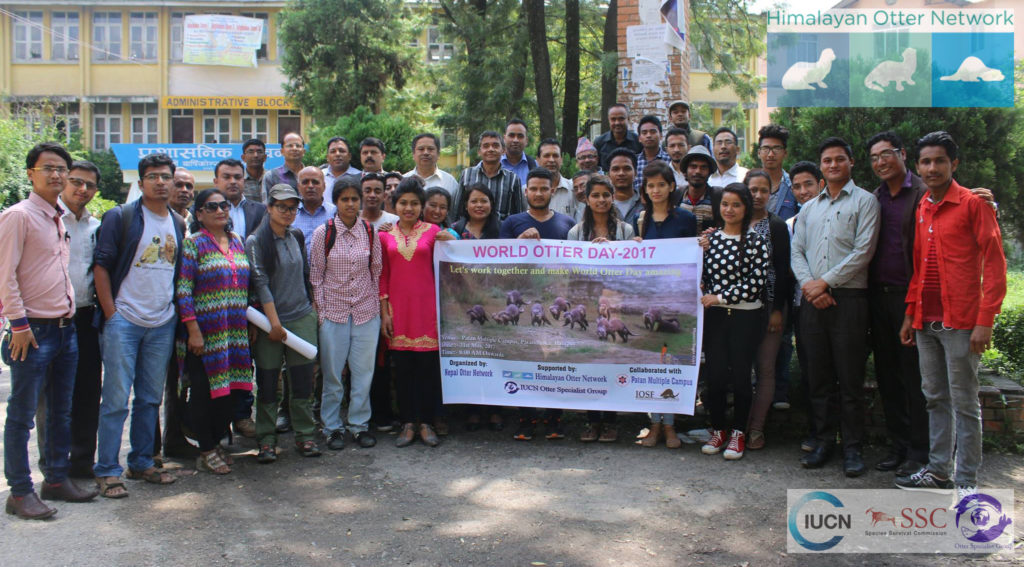
World Otter Day, celebrated each year on the last Wednesday of May, was a great success in Nepal this year. The focus being awareness, many people turned up and a true network began! The one-day workshop was coordinated by Mr. Purna Man Shrestha on the 31st of May in Patan Multiple Campus. Lectures included topics such as the current status of otter research in Nepal, the identification of the two otters species present in Nepal and facing the otter trade.
The full report on the very successful workshop can be read by clicking here.
During the discussions that followed the talks, there were a large number of queries regarding the general biology of otters. The university students showed a strong interest in learning more and will perhaps be prompted into joining our organisation in the future. On the whole, a splendid day that would not have been possible without the strong Nepal otter team and the support of the IUCN SSC Otter Specialist Group
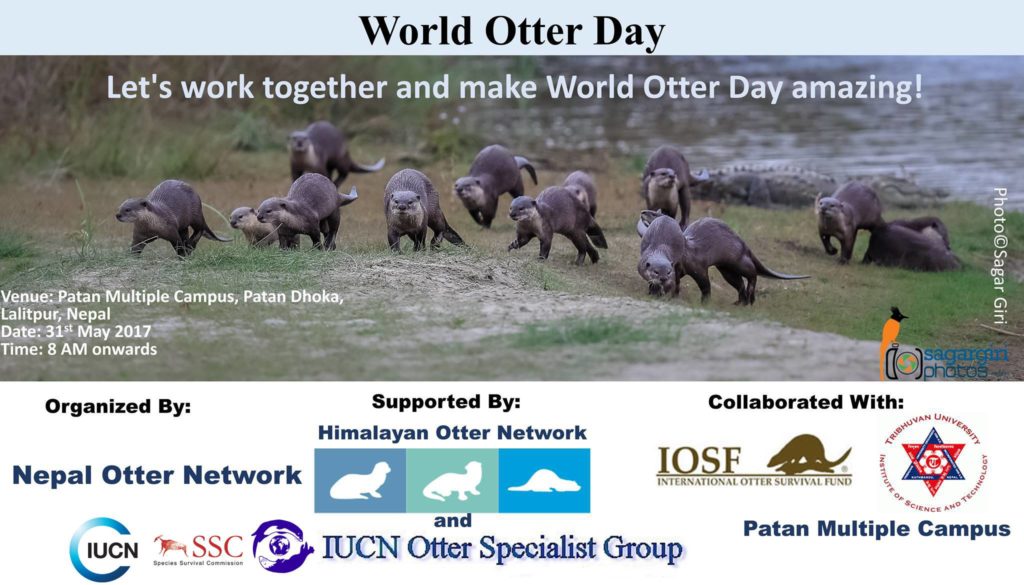
Nepal Otter Network is Organized – Jan 2017
Participants in the charter meeting of the Nepal Otter Network. From left to right: Purna Man Shrestha, Mohan Bikram Shrestha, Melissa Savage, Gandhiv Kafle, Sanjan Thapa, Paras Mani Acharya, Dhruba Bijaya G.C., Jyoti Bhandari, Rajesh Jha, Li Meng Jiao, He Bing, Deepak Gautam.
The charter meeting of the brand new Nepal Otter Network took place in Kathmandu in January, 2017. Organized by Dr. Jyoti Bhandari and supported by a grant from Wildlife Reserves Singapore, the meeting was an opportunity for otter researchers and conservationists to begin a collaborative effort to better understand and protet the otters in Nepal.
Many non-profit organizations and universities were represented, including the Nepal Biodiversity Conservation Society, the IUCN Otter Specialist Group, the Himalayan Otter Network, and Tribhuvan University.
The urgent need for otter conservation in Nepal was discussed and plans made to develop tools to strengthen the protection of otters across the country,where they face threats from hydroelectric generation construction, pollution, habitat fragmentation and the illegal trade.
A set of priorities for actions to better understand otter ecology and to better protect smooth-coated, small-clawed and Eurasian otters in the country. Priorities include a digital mapping of otter research projects, a list of habitat priorities by location, the keeping of a database of illegal otter trade records, a study of the shortcomings of the legal protection status of otters, and the assembly of a collection of educational materials. Paras Acharya offered to lead a field survey training in October, 2017, in Chitwan National Park. This is an exciting step forward for otter conservation in the Himalayan region.
13th International Otter Congress – July 2016
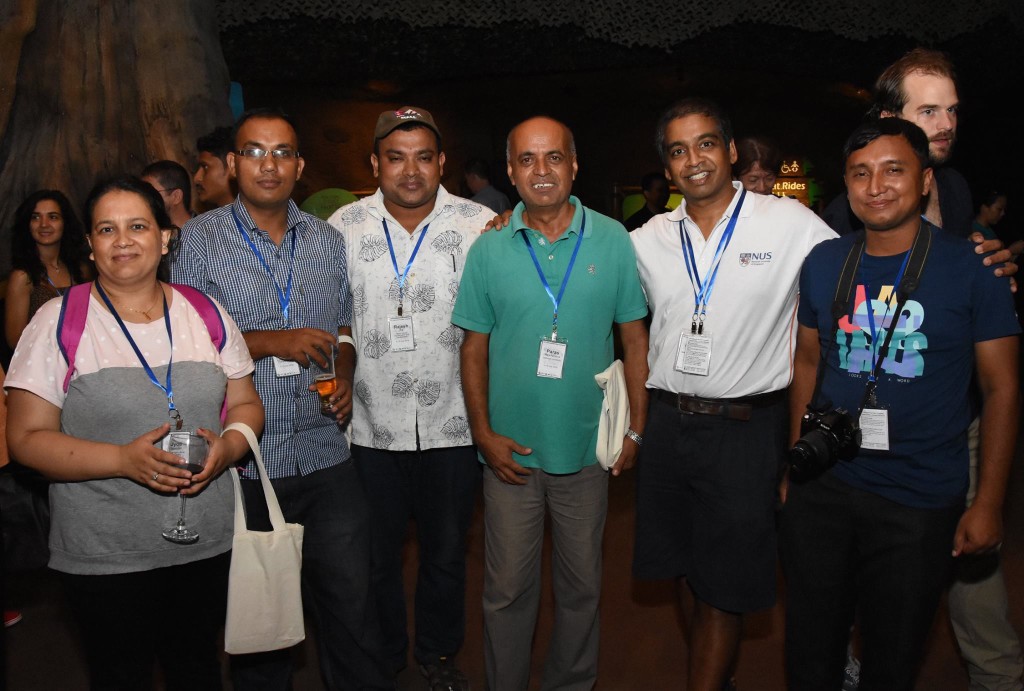
Photo: Ng Pak Chuan
From left to right: Jyoti Bhandari, Dhruba Bijaya, Rajesh Jha, Paras Mani Acharya, Sivasothi N., Sanjay Bahadur Thapa
The International Otter Congress is organised every 3 years by the IUCN SSC Otter Specialist Group, to share information on the ecology, population status, conservation strategies and threat mitigation for the 13 otter species worldwide.
The last two congresses were held in 2014 in Brazil and 2011 in Italy. This is the first congress to be held in Southeast Asia, where four otter species face mounting threats from the familiar human conflicts of habitat destruction and poaching for the illegal otter trade.
The 13th International Otter Congress was held in July 2016 at the spectacular Singapore Zoo. The conference, the first to be held in Southeast Asia, focused particularly on the illegal trade of otters in South Asia, which has now reached crisis proportions and threatens populations of all four species of otters present in South Asia. A number of otter researchers from the Himalayan Region attended.
The Singapore Congress is a key step in our Asian Otter Task Force Program, initiated in 2007. The meeting was attended by a raft of young, enthusiastic Asian students of otter research and conservation who met one another, shared information and started a fertile collaboration with the aim to plan future research projects together. Program presentations included many on otter ecology, threats to otter populations, outreach, education, community programs, monitoring techniques and social science research.
Three attendees proposed Himalayan projects for the special student research grants offered from the Congress: Jyoti Bhandari (for the initiation of a Nepal Otter Network), Sunita Khatiwara (for the first-ever survey for otters in Sikkim, India), and Rajesh Jha (Population Status and Distribution of Otters in Shuklaphanta Wildlife Reserve, Nepal). All three projects were generously funded by Wildlife Reserves Singapore in September, 2016.
Otters play a crucial role in wetland ecosystem health, and nowhere is this more threatened than in South Asia. Further information on the meeting, and presentation abstracts will be available later in the year on the OSG website.

